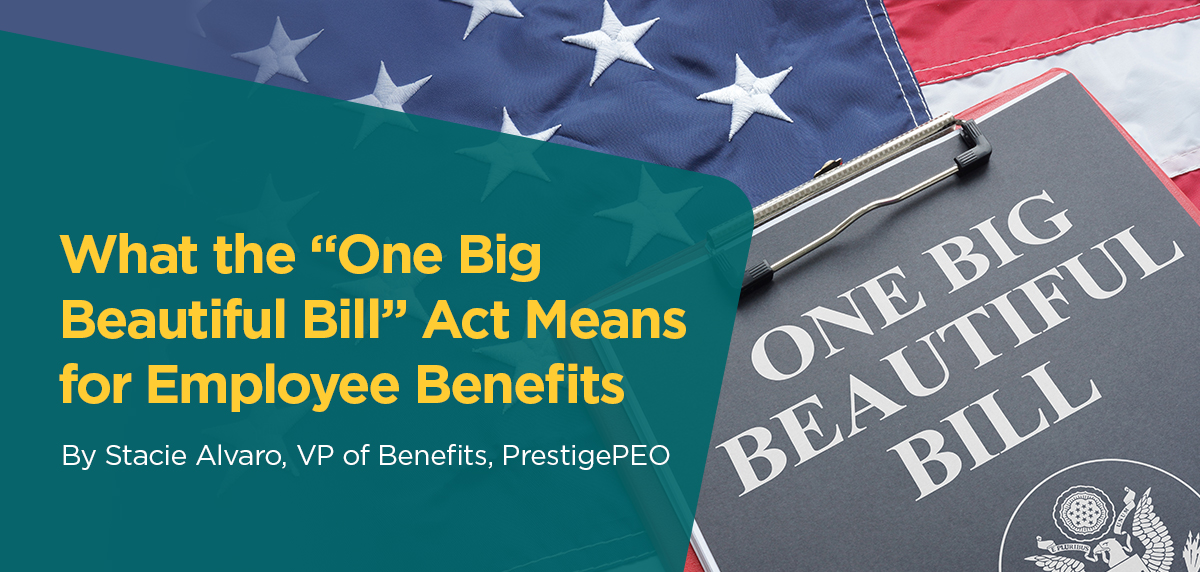
Congress recently passed the One Big Beautiful Bill Act (OBBB), a sweeping federal package that includes key employee benefits updates beginning in 2025 and 2026.
The OBBB includes new federal rules that directly affect how employers offer benefits like HSAs and Dependent Care FSAs. In this article, we break down what’s changing and what’s not, and how PrestigePEO is helping clients stay ahead of it all.
At PrestigePEO, we’re keeping a close eye on what this means for your business, your employees, and your benefit strategies moving forward. Here’s a quick rundown of the major changes you should know about:
HSA & Benefits Updates at a Glance
Telehealth and HSAs: A Permanent Match
The temporary flexibility to cover telehealth services before the deductible, originally introduced during the pandemic, has now been made permanent for High-Deductible Health Plans (HDHPs).
This change is effective retroactively to plan years beginning after December 31, 2024, when the last extension expired. Individuals remain HSA-eligible even if their HDHP covers telehealth services before the deductible, offering continued flexibility and cost savings.
HSA Eligibility Expanded to More Marketplace Plans
Beginning in 2026, an individual enrolled in a Bronze or Catastrophic plan on the Individual Health Marketplace will be treated as HSA-eligible, even if the plan doesn’t meet the usual deductible or out-of-pocket minimums.
Direct Primary Care Now HSA-Compatible
Also starting in 2026, individuals using Direct Primary Care (DPC) models will be able to fund these services through their HSAs. Monthly DPC fees, up to $150 for individuals or $300 for families, can now be paid directly from an HSA and won’t interfere with eligibility.
Dependent Care FSA Limit Increased
For the first time in nearly 40 years, (except for the temporary increase during the pandemic), the annual contribution cap for Dependent Care FSAs is going up. Starting in 2026, employees can contribute up to $7,500 (or $3,750 for those married filing separately), giving working parents more flexibility to manage dependent care expenses tax-free.
Bike Commuter Benefits Permanently Removed
The $20 monthly tax-free reimbursement for biking to work, which had already been suspended through 2025, is now permanently eliminated under federal law. Employers may still offer this benefit, but reimbursements will now be treated as taxable income.
What Didn’t Make the Final Bill?
While earlier drafts of the bill proposed broader HSA and HRA enhancements, including coverage for gym memberships, expanded eligibility for individuals on Medicare Part A, and rebranding ICHRA’s as “CHOICE Arrangements, those items were ultimately left out of the final legislation.
So, what remains are the key HSA-related improvements noted above, plus the increased Dependent Care FSA cap and permanent removal of the bike commuter benefit exclusion.
We’re Here to Help
As always, your PrestigePEO Benefits team is here to walk you through these changes and how they may affect your benefit offerings in the year ahead. If you have questions about HSAs, FSAs, or any new compliance requirements stemming from the OBBB, reach out to your dedicated Benefits Specialist. We’ll ensure you’re prepared and informed every step of the way.




